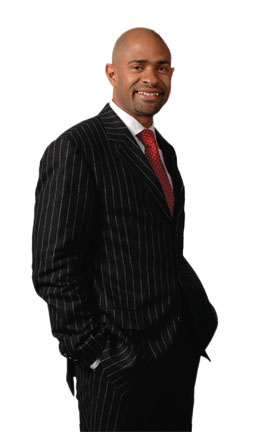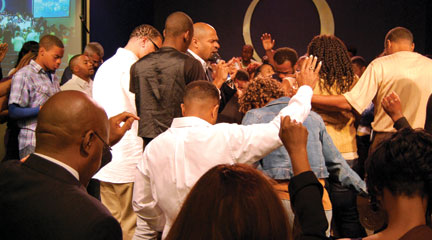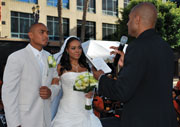
 Wayne Chaney Jr., senior pastor, Antioch Church of Long Beach, Long Beach, CA
Wayne Chaney Jr., senior pastor, Antioch Church of Long Beach, Long Beach, CA
By Ronald E. Keener
This particular Saturday was the fifth wedding anniversary of Wayne Chaney Jr. and his wife Myesha, an occasion when they usually kicked back, enjoyed a leisurely dinner and spent quality time reflecting on their marriage. But the day began at 9:00 with a wedding ceremony, a 10:00 interview with a writer, a 2:00 funeral and burial, a 3:30 wedding in Los Angeles, and a 5:00 comedy showcase at Antioch Church of Long Beach. By the time they drew their breath at 8:00 that evening they had fallen asleep in the back of a limo ride to a restaurant. They opted instead to celebrate a week later in Palm Springs.
Such scheduling is often the norm for this pastor. Chaney, 30, has had ministry on both his parents’ sides of the family. His grandfather, Joe Chaney Jr. founded Antioch 48 years ago, “full of love and concern for people,” Wayne Chaney says of him.
On his mother’s side, his great grandfather was a slave whose family purchased his freedom in the 1800s when the elder man was a teenager.
Wayne Chaney became pastor of the congregation seven years ago, after a visit to his grandfather “that just literally broke my heart.” Along in years, Joe Chaney had founded a cutting edge, pioneering church, but it fell back in attendance and energy.
“I came back to visit. He had gotten up in age and didn’t have the help that he needed. At one of the services there were a few people there, the second service there were whole rows empty.
“I remember friends and family hadn’t seen me in some time and wanted to speak with me, but I just couldn’t take it. I left in tears, went home and just prayed about what God would have me do. If I could help in any way, I was definitely open to that. I guess that was the beginning of my burden for ministry here.”
What was the church like then, in its heyday?
Long Beach is a very interesting town as it relates to churches. Some have nicknamed it the preacher’s graveyard, just because it’s an interesting environment for several reasons.
It’s not a monolithic city by any stretch of the imagination; it’s very diverse. It has been voted the first or second multi-culturally diverse city in the U.S., per capita. It brings various racial and religious backgrounds, that for many church growth strategists, presents somewhat of a challenge.
This church was probably, in its heyday, maybe 500 or 600 members, which is a pretty large church considering this area. That was in attendance, but over the years probably every person, at least African American person in Long Beach, has been a member at one time or another of Antioch. Over 48 years the membership has been 5,000 or 6,000, but in attendance about 500 or 600.
You said this is a difficult city for religion. How so?
It’s a very liberal city in some of its political and social views. I believe it has the second largest homosexual population outside of San Francisco, per capita. They have the largest gay parade here in the city. They call it the Pride Parade, and naturally with that comes a little bit of political influence. It’s not necessarily a pro-church city. But over the years we’ve had great relationships and God has given us favor with city officials, on the whole.
It is what they call a “Mayberry metropolis.” There’s still a hometown feel here, where it’s not difficult to forge relationships with the city officials and political camps.
You’re speaking at the Black Church Leadership and Family Conference of the Southern Baptist Convention. How is it important that the black church has its own meetings?
Couple things. The first thing is we believe that there is a church, the church of Jesus Christ. Historically, it was called Black Church Weekend. They discovered there are some unique challenges as well as expressions as it relates to local gatherings of the African American experience.
The conference is to help navigate them through some of those things. It is training that is just a little bit more specific, so what you’ll find at the Black Church Conference will probably be the same tools that any church will find via LifeWay [Resources] to equip their churches. But they just make it a little more specific considering some of the dynamics African American pastors are facing in this generation. But the heart of it would be the same type of training, the same research.
But then there’s another side as it relates to the Southern Baptist Convention at large. They’re working on it, but the percentage of African Americans is not as large and so what you’ll find there is a unique sense of community as it relates to their unique expression of worship.
 Do you use the word black and the term African American interchangeably?
Do you use the word black and the term African American interchangeably?
Yes, we use them interchangeably. It is so hard to keep up with the politically correct thing. I’m confused and I’m black. In terms of this conference and in our culture, the words generally speaking would be interchangeable.
Are their issues that are unique to the black church?
One of the issues is reentry of people who have become incarcerated and the challenge as it relates to the portion of the population that had either spent time in jail, coming out of jail or currently incarcerated.
You have issues like fathers in the home, fatherlessness and the dynamic that plays. How do we proceed and equip people in our local congregations who are from broken households? It is assumed with many curriculums to equip the parents, but what do you do with children being raised by grandmothers or a single mother?
Other issues are employment, education, now to keep people engaged, how to partner with local schools and school districts to insure that children who are performing below the standards, can meet those standards. Over the years African American churches have had to minister the Gospel but also address these social issues head-on. Just because of the deficit position historically that some of the congregants have been in over the years.
So what was it like to have the first black President?
Wow, no matter what your politics were, historically it was a milestone, especially for people who lived through the civil rights era. You should have seen it here that Sunday. It wasn’t about his politics specifically, as much as it was them saying what they didn’t think would be possible in their lifetime. I can imagine how that magnified it for them, considering I questioned whether it could be done in my lifetime.
I remember the movie, Deep Impact, where a meteor was going to hit the Earth and Morgan Freeman was the president. I remember watching that movie just two years ago and I said this is a wonderful film, but the only thing that is a bit unbelievable about this is Morgan Freeman. [Laughter.] That doesn’t fit, you know. And in my lifetime, just a few years later, to see the first African American president — it was unbelievable to me.
We don’t realize how many boundaries we set for ourselves, even subconsciously, until that took place.
We had a polling place at the church and the people who came out to vote ranged from professional adults to, I mean literally, the gang members that stand on the corner and sell drugs down the street. Some of them came in here in suits and others came in here with their pants sagging and their gang attire on — but voting. It was the most amazing thing to see that diversity.
But the flip side of that is the motivation and self esteem it brought to some of them. Some of these were people who had given up on life, they had no hope as it relates to their future and their destiny. So it provided — I can’t explain it — but it provided an internal drive and motivation that they had lost and had given up on. I don’t think many of them even understood his politics fully, but to see him in that position, it provided that motivation.
How did you come about giving direction of the Long Beach Gospel Fest, the first one ever, I understand, and with three weeks advance notice?
The church has been here in the community for about 48 years. The city has come to us about the issues of the community, and we sometimes strategize about how we can work together as a community a little bit better.
City officials knew us and asked if there is something we can do because the Martin Luther King parade, which is the second largest in the state after Los Angeles, had about half the budget this year.
So they asked if we could throw a concert or do something downtown to help with that effort. We met with the business and the restaurant owners, and all of those involved political parties. The county supervisor was on board, the convention center bureau was on board, the Port of Long Beach was on board, which was unheard of for a gospel event.
We met with them and we came up with the name and the concept. There is a Long Beach Jazz Fest, a Long Beach Blues Fest, a Long Beach Reggae Fest, all of these years and there was no Long Beach Gospel Fest or worship fest.
You had some early background for this?
My first job at 15 years old was to work for the man who puts on the Long Beach Jazz Festival, so I was able to see behind the scenes. Growing up that was my first job, no one else would hire me, I was too young. My aunt was the publicist, I answered phones. I didn’t know that God was allowing me to see all these things behind the scenes.
So fast forward 15 years later, we are downtown meeting with the business owners who had always wanted to do something and they have six days a year where they are able to block off the streets in the heart of downtown where the businesses and restaurants are.
We said we’ll have a Gospel Fest. My wife and I purchased the name because we knew this was going to be great; we wanted to make sure they couldn’t stop us from having it in years to come, because once they saw that we clearly and boldly proclaim the name of Jesus, we didn’t want them to cut us off. So we bought the LLC, the DBA, domain name for the Long Beach Gospel Fest, Gospel by the Sea, so that we own it, so the churches would be able to participate for years to come.
And your church, with a few others, made it happen?
We have a broadcast on KGLH as well as every Sunday called the Spiritual Seed (Breakthrough) and we promoted it there. We told our people about it and they brought their friends, family and loved ones.
Probably 5,000 or 6,000 passed through it within that day. They blocked off major streets, Pine and Broadway, and it was just a success.
The mayor said this is something that the city needs; the police said this is the greatest event that they have had down there; the councilmen said it was a long time coming. And this does not sound like Long Beach. Not one complaint in the heart of probably one of the most difficult territories in all of the city; we got nothing but just praise to God.
We had 150 confirmed decisions that day just from the message during the worship service time, and another 50 or 60 during the concert as people were sharing Christ with those out there.
What did you speak about?
That was interesting. I had a full length message prepared and one of the things we believe here, one of our characteristics is being led by the Spirit, and we’re sensitive to what God is doing and we try to adjust our plans to what He desires.
Our youth did a skit that was actually the message. It had no words, but kind of chronicled the journey of a person who started out with Jesus Christ, was beat up by the world, the lust of the world, by substance abuse, by not thinking they were good enough, by depression, suicidal thoughts, vanity and money. It chronicled that journey and how Christ stepped in and redeems.
By the time they finished there was not a dry eye, as far as I could see, in the entire street. In that moment, it would have almost been anticlimactic to go into my three-point message. [Laughter]
So what I did was I stepped into that moment and explained to them what they just saw in this skit. I explained to them that this is the story of many of the members who have joined here [at Antioch], and many of you have found yourself at one point in time or another separated from God.
I told them it’s no mistake that you are here, it’s no accident, he ordered your steps here for you to be connected to him again. I just preached the Gospel and let them know what Jesus did on their behalf and how he loves them no matter what they’ve done, no matter where they’ve been. We had prayer counselors set up back stage.
We had people who weren’t even believers say it has to be divine intervention because things are working that aren’t supposed to be working. We fasted and prayed leading up to it and asked God to do something tremendous and He did. It exceeded our wildest expectations.
 COUPLE INVITES THE CITY TO THEIR WEDDING
COUPLE INVITES THE CITY TO THEIR WEDDING
It’s not every marriage where the bride can invite thousands to the ceremony — and doesn’t need to feed them afterward. A couple years earlier, Siobhan and Austin Wilson met in downtown Long Beach at Pine and Broadway Streets. On July 12 this year the couple married at the same intersection on the stage of the Gospel Fest. It was her congregation, Antioch Church of Long Beach, that worked with city officials in putting on the Fest. Both she and the church had three weeks notice to organize both events, the wedding taking just a mite more preplanning and scheduling than the Fest.
Siobhan is a freelance makeup artist and deaconess at the church, and Austin is a deacon and works for ProAir.
The couple had a formal wedding on the stage following the Gospel Fest concert, presided over by pastor Wayne Chaney Jr.
The Wilsons already have plans for their first anniversary — at the Gospel Fest 2010 at Pine and Broadway.



We at USA People are devoted to help create jobs, and to strengthening the people in our communities morally, and financially. By being innovated your church can hire 1-2 people, and increase your revenues without putting up any money. We are asking for 10 percent of these particular profits to help USA People further the fight against poverty.
Thank you Pastor Chaney and First Lady Chaney
For showing the world that it ok to to be young and save with Holy standards. You guys is around my children’s ages and I am so proud to see young people in The Lord ( like you guys) showing your true love and affections toward each other. I feel that our young people need to see romance between a man and a woman in The Lord, and what it look like. I love you guys for keeping it real and Holy, please do not change.
May God continue to keep blessing you two.
Thumbs up! You are doing Joe Chaney proud